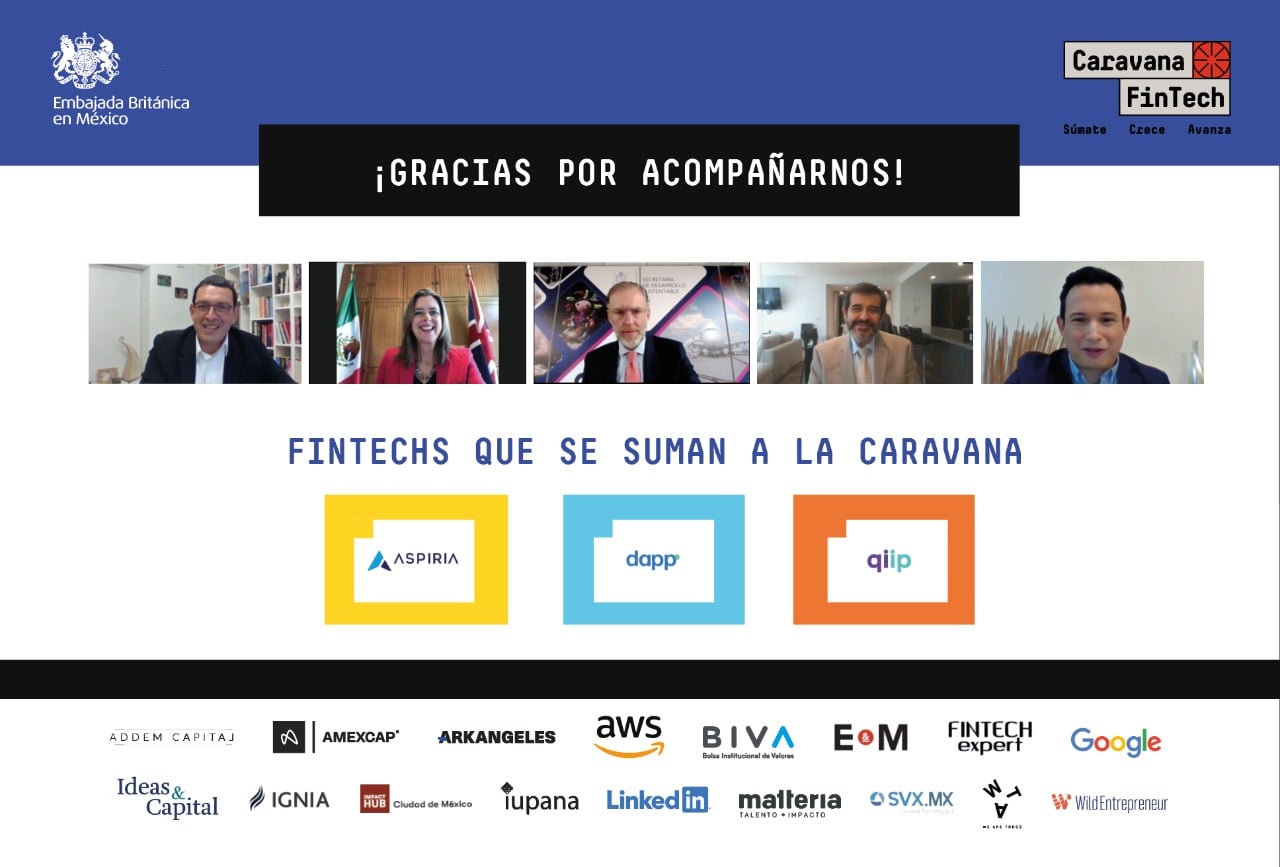Let us know what type of content you'd like to see more of. Fill out our three question survey.
Increasing Adoption and Awareness of Fintech Solutions in Mexico: Q&A with Roberto Velez and Lorena Segura
Nov 19, 2020
Launched in 2019, the U.K. Foreign, Commonwealth & Development Office’s (FCDO) Prosperity Fund Mexico Financial Services Programme aims to create a more inclusive and competitive financial services sector accessible to all segments of Mexican society and market entrants. Despite challenges due to COVID-19, this project has been able to hit the ground running with Caravana FinTech, an initiative that seeks to increase adoption and awareness of financial technology (FinTech) solutions that benefit micro, small, and medium enterprises (MSMEs). I recently spoke with Roberto Velez, FinTech Adoption and Socialization Lead, and Lorena Segura, FinTech Socialization Leader, about how the programme is supporting MSMEs to expand their reach and encourage the use of FinTech solutions.

Q: Can you give me some background on Caravana Fintech and its objectives?
A: “The first thing that’s important to understand is that we have an opportunity here. Some 89 percent of the population in Mexico has a smartphone. However, only 37 percent have a bank account. This is a big gap that can and should be addressed by FinTech solutions. Therefore, Caravana FinTech implements activities to communicate and promote the use of FinTech solutions in at least six states across Mexico (we hope to have national coverage by the end of the project). These activities are carried out in conjunction with public and private sector partners and work to share FinTech’s basic concepts, explain products and services, and demonstrate how these concepts are translated into practice. The ultimate goal is to accelerate adoption and general knowledge of FinTech solutions. To do so, we go state to state to better understand the local context, including the financial services needs of local MSMEs, and then work to map those needs with appropriate solutions. We then put out an open call for FinTech firms to design solutions to address the identified needs. We also generally want to grow the population’s knowledge of FinTech solutions through socialization activities. Through webinars, workshops (now virtually), and other communications strategies, we want our target audience to better understand how FinTech solutions work and can benefit them.”
Q: What are the key barriers that MSMEs face to adopting FinTech solutions in Mexico?
A: “The lack of digital capabilities and knowledge of the benefits of digital solutions are key barriers. For example, in a survey conducted in 2019, 59.63 percent of shopkeepers responded that they did not know what a QR code was, and 54.49 percent did not believe that electronic payments would be successful in their businesses. But, it’s not just knowledge about what FinTech solutions are and what they can do for their businesses, but also knowledge of new regulations that protect them as customers. FinTech is a relatively new sector in Mexico; the FinTech Law that protects customers was just passed in 2018 and the ways that FinTechs are now regulated has not been appropriately socialized yet to people and businesses. As a result, small businesses are fearful of sharing information with the FinTech firms because of a lack of trust and assurance that their information won’t be stolen. In short, it’s the lack of knowledge about the existence of these solutions and the lack of knowledge on how they are regulated and what the government authorities, mainly the National Commission for the Protection and Defense of Users of Financial Services, can do to protect customers from fraud and abuse. This is why socialization is so important.
“The final major barrier is infrastructure and connectivity. Even if we build trust and knowledge of the benefits of FinTech, if connectivity is poor, businesses are limited in the solutions they can adopt since internet and cloud services are at the core of FinTech solutions.”
Q: What are some activities the project is doing to address these barriers?
A: “First, we go to a chosen state and engage with the state government and private sector. Together we develop a stakeholder map of relevant actors in the state. This can include various ministries, such as economic development, youth, education, innovation, etc. We then map the existing financial services-related activities to use them as a starting point. Next we identify the gaps and customize the programming and messaging to the needs of the customers. For example, the Ministry of Economic Development in Querétaro already had training for MSMEs on how to be more competitive in the market. We joined that training to talk about the benefits of FinTech solutions (socialization) and will be working with FinTechs so they can show MSMEs how to use and adopt their solutions (adoption).
“We learned that technology adoption is most prominent while students are completing their bachelor’s degree. So, we worked with the Ministry of Education to communicate the benefits of FinTech for entrepreneurs and early financial services users in general, as well as the future of work in the Fintech sector, as there is a need for specialized workforce in Mexico. For example, many students have trouble getting credit cards without a credit history. We talk to students about how FinTechs can use alternate credit scores through e-wallets and other solutions to reduce this requirement. We also partnered with LinkedIn to talk about employment trends in the FinTech sector.
“We also work with the entrepreneurship ecosystem, connecting startups that struggle to get funding so they can learn alternative ways of crowdfunding and flexible credit solutions. In short, we take a multi-pronged, multi-stakeholder approach in each state to better socialize and increase adoption of FinTech solutions. Now, Caravana FinTech is working on the second state and aims to launch a third one by March.
“The last major activity that we are kicking off is the open call for FinTech firms. Once we identify the needs of small businesses in a state, we put out a call to attract FinTech startups to find ways to address those needs. Querétaro is the first state we are working in. We launched the call in August, in September the applications were evaluated, and the three finalists were chosen. We are now starting a series of workshops for the winners that help them understand the portfolio of products that customers need, the customer journey, and how to ease the onboarding process. They will also hear from experts on gender, financial inclusion for vulnerable populations, and human-centered design. The key goal of these workshops is to get these FinTechs to recognize the need and business opportunity of targeting vulnerable populations and businesses.”

Winners of the open call to FinTechs in Querétaro.
Q: Are there any regulatory constraints that the project must navigate?
A: “The regulatory environment is tense. As I mentioned, in 2018, the FinTech Law was passed. Following that law, the first group of FinTech firms submitted their applications to be officially licensed. During the application review process, existing FinTechs could continue operating while waiting for their licenses, but new FinTech firms that applied were not allowed to operate at all. This would not be a problem if the license were approved quickly, but because of the pandemic, the process is extremely delayed. This means that new FinTech firms looking to raise private investment and start operations are at a standstill until they receive their license.”
Q: What are the specific issues that women-owned MSMEs face? How is the project addressing those issues?
A: “The main obstacle that women face when starting a business is not actually lack of capital, but lack of information about financial products and the paperwork required. Banks do not appropriately target women-owned businesses even though 28.3 percent of Mexico’s SMEs are led by women. Eighty percent of Mexican women entrepreneurs thought that banks should have differentiated products that are adapted to the needs of women entrepreneurs and use a simpler and more inclusive language, focused on providing them with security and trust. This is an argument for FinTechs to create more tailored solutions that are more inclusive and instill trust in women. It’s also good business; out of every 100 women who apply for a loan, 99 pay off their debt in full. That is why this project is focused on having workshops that demonstrate the need for financial inclusion. By understanding the gender discrimination issues in traditional banking and the financial lifecycle experience by women, FinTechs are more able to formulate products that women will use. This is not about gender stereotypes, making an app pink instead of blue, for example. It’s deeper than that.”
Q: How is COVID-19 affecting your programming?
A: “Well, of course, we can no longer do this work face-to-face. This is a problem because when we are working with vulnerable populations, face to face is better because it builds trust. People need to see and feel what you are doing. They need to know there is a person they can call if they have issues. We lose that when working virtually. Initially, Caravana FinTech planned to engage market leaders from rural areas as well, but because we are doing everything remotely, it’s much harder to reach people in those areas. Most of our attendees are based in cities.
“We’ve also seen that the pandemic has forced businesses to adapt and digitally transform overnight to survive. Small businesses have to start using apps to pay bills and charge customers because people no longer want to use cash. New platforms require bank accounts in order to do transactions so more and more businesses are becoming a part of the digital economy out of necessity. The problem is that some small businesses, the most vulnerable, are still left behind; those who do not have smartphones or connectivity of course struggle with this. Our main concern is targeting efforts toward vulnerable people that must transform digitally to succeed in ‘new normal.’”